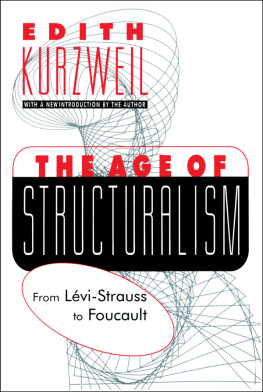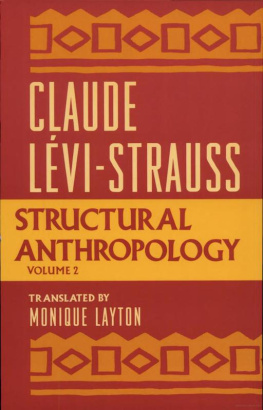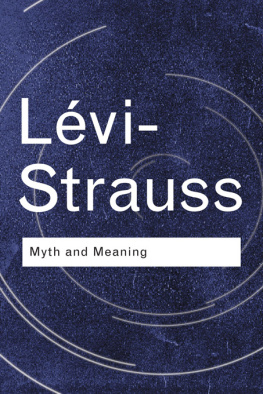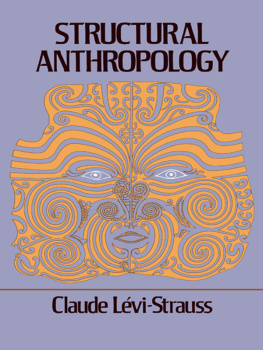ROUTLEDGE LIBRARY EDITIONS:
SOCIAL THEORY
Volume 39
LVI-STRAUSS
LVI-STRAUSS
Structuralism and Sociological Theory
C R BADCOCK
First published in 1975
This edition first published in 2015
by Routledge
2 Park Square, Milton Park, Abingdon, Oxon OX14 4RN
and by Routledge
711 Third Avenue, New York, NY 10017
Routledge is an imprint of the Taylor & Francis Group, an informa business
1975 C R Badcock
All rights reserved. No part of this book may be reprinted or reproduced or utilised in any form or by any electronic, mechanical, or other means, now known or hereafter invented, including photocopying and recording, or in any information storage or retrieval system, without permission in writing from the publishers.
Trademark notice: Product or corporate names may be trademarks or registered trademarks, and are used only for identification and explanation without intent to infringe.
British Library Cataloguing in Publication Data
A catalogue record for this book is available from the British Library
ISBN: 978-0-415-72731-0 (Set)
eISBN: 978-1-315-76997-4 (Set)
ISBN: 978-1-138-78425-3 (Volume 39)
eISBN: 978-1-315-76379-8 (Volume 39)
Publishers Note
The publisher has gone to great lengths to ensure the quality of this reprint but points out that some imperfections in the original copies may be apparent.
Disclaimer
The publisher has made every effort to trace copyright holders and would welcome correspondence from those they have been unable to trace.
Lvi-Strauss
Structuralism and
Sociological Theory
C R Badcock
Hutchinson of London
Hutchinson & Co (Publishers) Ltd
3 Fitzroy Square, London W1
London Melbourne Sydney Auckland
Wellington Johannesburg and agencies
throughout the world
First published 1975
C R Badcock 1975
The paperback edition of this book is sold subject to the condition that it shall not, by way of trade or otherwise, be lent, resold, hired out, or otherwise circulated without the publishers prior consent in any form of binding or cover other than that in which it is published and without a similar condition including this condition being imposed on the subsequent purchaser.
Printed in Great Britain by The Anchor Press Ltd and bound by Wm Brendon & Son Ltd both of Tiptree, Essex
ISBN 0 09 124830 2 (cased)
ISBN 0 09 124831 0 (paper)
Anthropology must be ecumenical.
Salvador Dali
(Descharnes, World of Dali, p. 68)
Contents
This is not a book written by a believer in structuralism. If it were, I do not think that it would be very helpful to those to whom it is principally addressed. It is a book written for those whose interest in structuralism, and in Lvi-Strauss in particular, arises mainly from a concern with the place of structuralism and its major exponent in modern sociology and anthropology. I have written it very much from the point of view of sociological theory and the history of sociological thought. Students of the social sciences and the general reader who has some familiarity with the field will, I hope, find it useful. Those who know more about structuralism, and particularly about Lvi-Strauss, will probably not always agree with me, but will, I hope, find what I have to say worthy of consideration. Specialists will probably be scandalized by the absence of structuralist jargon and an approach which may appear too simple for the works of a writer such as Lvi-Strauss. For this I am unrepentant, and feel that, given the limited aims of this book, intelligibility takes priority over faithful adherence to the masters frequently untraceable footsteps through the labyrinth of structuralism.
As far as my own safe passage through it is concerned, I owe a debt of gratitude to Professors Donald MacRae, David Martin and Ernest Gellner, and especially to Professor Percy Cohen.
C.B.
The principal interest of Lvi-Strauss, both to students of the social sciences and to the reading public in general, is that he is the most well-known and widely read author belonging to what has now become known as the structuralist school. This is a label which he himself clearly accepts, using it a number of times in his works, and in the title of at least two of them. Certainly, as far as the social sciences are concerned, one might feel quite confident in calling Lvi-Strauss, the leader of the movement, or, at the very least, its most prominent exponent in the fields of anthropology and sociology.
The interest of structuralism as a movement in the social sciences originates from its claim, implicit or explicit as the case may be, to give a new insight, or consciousness, of man and his doings. This is something which is basic to all human sciences, and to sociology, anthropology and psychology in particular. Because man participates subjectively in being man, and because his works constitute his own subjective awareness, all of these sciences have striven from their very beginnings to give man a new insight into himself and a new consciousness of the society of which he is a part. The principal appeal of structuralism lies in the fact that it has attempted to do this in what appears to be a rather new way.
It has offered explanations of man and culture in terms of what Chomsky has called deep structures. These deep structures are principles of mental functioning which are unconscious but which structuralism attempts to uncover and, in anthropology and sociology at least, to reveal as the true basis of the phenomenon of culture. In attempting to uncover these collective and unconscious determinants of behaviour structuralism plays in the social sciences a role analogous to that of psychoanalysis in individual psychology. Both claim to give a new awareness, a deeper insight into processes which affect us, but of which, until these disciplines emerged, we were largely unaware. And as we shall see later, it is one of the principal aims of this book to show just how much structuralism owes to psychoanalysis.
The desire to have a new consciousness of society, a new insight into culture is, in my opinion, the chief appeal of the social sciences in general, both to students entering on university courses in these disciplines, and to the general public in reading about them. The nature of the hoped-for new consciousness does, of course, vary widely. Some regard the study of sociology and social anthropology as a means of personal liberation from social forces which previously constrained them, but which, once understood for what they are, can be transcended by the individual. In this respect the social sciences play the part of the unmasker of mystifications, the debunker of myths, and the university becomes the slaughter-house for sacred cows. Others look to the social sciences for a consciousness of the realities which underlie the social structure which affects all of us and whose processes we all participate in. Since participation is to a large extent obligatory, it is as well if we can have some reliable information about exactly what we are a part of. Sociology and the study of contemporary social structures in particular is seen as a means to the end of a more rational awareness of social, political and economic realities, and, it is hoped, a more reliable basis for policy decisions.










